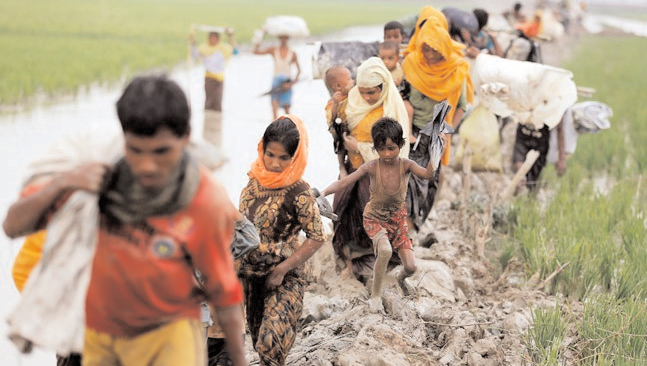KUTUPALANG, UKHIA (BANGLADESH) (TIP): Akhira Dhar sits in stony silence in one corner of the makeshift camp for Rohingya refugees.
Her glazed eyes have a blank stare that seems oblivious of the bustle in the camp as a fresh wave of refugees arrive, carrying with them scars and hopes. It takes a long time for Akhira to return to the present. But the horrors of the recent past have simply overwhelmed her.
In the past week, Akhira has seen her husband and in-laws being hacked to death. Masked men armed with guns and machetes beheaded them after they looted everything the villagers had. That they were Hindus, minorities among the Rohingyas, didn’t matter. In the Rakhine state, violence and persecution obliterated religious boundaries. Hindu women were raped and killed before their villages were burnt.
At Fakir Bazar, the village where Akhira was married into barely a year ago, the masked men did not spare a single male member. The blood and gore that she witnessed still numbs her. “Hadi felay (They kill everyone),” she murmurs. How she, carrying a fourmonth life in her womb, managed the crossing across the hilly terrain and jungle tracts braving wild animals is difficult to comprehend but she did finally make it to Merinja opposite Naikhong Chari in Chittagong. Here, she is now housed in Hindupara, a Hindu settlement within the Kutupalang Camp.
Rikha Dhar, another refugee in Hindupara, recounted how her husband who had a gold shop in Myanmar‘s Fakir Bazar was tortured by masked men till he disclosed where he had hidden the jewellery. Once he did though, they slit his throat. “My husband told them about the jewellery when they threatened to kill our children. They then took him blindfolded towards the hills. When we were fleeing, we found his blood-soaked body along with hundreds of others,” she recalled. The masked men, survivors are convinced, are not the armed forces as they speak the Rakhine dialect. These men, with their faces hidden, had spread a reign of terror in villages with Hindu settlements.
The gun-toting masked men came one Thursday afternoon and drove us into our homes. For the next six days, they did not allow anyone to come out. On the seventh day, when they had gone to a nearby village, we fled for our lives,” said Bijay Ram, a Rohingya Hindu who managed to escape along with 120 more families from Oti Roah village in Myanmar. While trekking through the jungle, they found Akhira, Rikha and six other women with children. (TNN)
